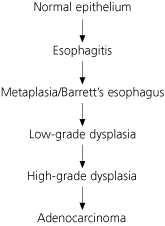How many people with esophageal cancer are obese?
After all, obesity is a well-established risk factor for esophageal cancer – a disease with a very grim prognosis.
When we hear about the many disease states that obesity is a risk for, we often think only about heart attack, coronary artery blockage, stroke, type 2 diabetes and damage to the knee joints.
But obesity is a driving force behind some cancers, and colon and uterine cancer may come to mind.
However, being obese – defined as 20 percent over one’s ideal weight range for their gender and height – is a strong risk factor for esophageal cancer.
“In the past when the most common esophageal cancer scenario was patients with squamous cell carcinoma in the mid-third of the esophagus, the patients tended to be thin, even emaciated,” says Alex Little, MD, a thoracic surgeon with a special interest in esophageal and lung cancer.
Dr. Little continues, “As time passed and the scenario became one of adenocarcinoma in the lower third of the esophagus, the typical patient appearance changed — so that now, the majority of esophageal cancer patients are overweight or obese.
“This is speculated to be because these cancers are frequently associated with Barrett’s esophagus, which is found in patients with reflux — who are generally overweight or obese.
“The National Cancer Institute website on obesity and cancer has data.”
Barrett’s Esophagus: Caused by Chronic Acid Reflux, Can Turn into Esophageal Cancer

The evolution of Barrett’s esophagus.
Obesity causes a mammoth repertoire of medical conditions – not just the “big” ones that kill many people.
One of the “smaller” conditions that obesity frequently causes is that of stomach acid chronically refluxing up into the esophagus.
This can cause heartburn, chest discomfort, burping, cough, throat burning and a hoarse voice.
TV commercials for heartburn often present as comedic, which actually waters down the seriousness of long-term GERD.
But long-term, untreated or poorly treated GERD is a significant risk factor for esophageal cancer because it can lead to the precancerous condition of Barrett’s esophagus.
A person may have no idea that this condition exists inside their esophagus; only an upper endoscopy can reveal it.
If you’re obese or even in the overweight range, you’d be doing your digestive system a huge favor by losing weight, which should be done via sustainable lifestyle changes rather than some so-called fad diet that’s difficult to adhere to.
As for what percentage of esophageal cancer patients are fat? There is no collected and formalized data on this.
However, you now know why being overweight is a risk factor to take very seriously.
 Alex Little, MD, trained in general and thoracic surgery at the Johns Hopkins University School of Medicine; has been active in national thoracic surgical societies as a speaker and participant, and served as president of the American College of Chest Physicians. He’s the author of “Cracking Chests: How Thoracic Surgery Got from Rocks to Sticks,” available on Amazon.
Alex Little, MD, trained in general and thoracic surgery at the Johns Hopkins University School of Medicine; has been active in national thoracic surgical societies as a speaker and participant, and served as president of the American College of Chest Physicians. He’s the author of “Cracking Chests: How Thoracic Surgery Got from Rocks to Sticks,” available on Amazon.
 Lorra Garrick has been covering medical, fitness and cybersecurity topics for many years, having written thousands of articles for print magazines and websites, including as a ghostwriter. She’s also a former ACE-certified personal trainer.
Lorra Garrick has been covering medical, fitness and cybersecurity topics for many years, having written thousands of articles for print magazines and websites, including as a ghostwriter. She’s also a former ACE-certified personal trainer.
.












